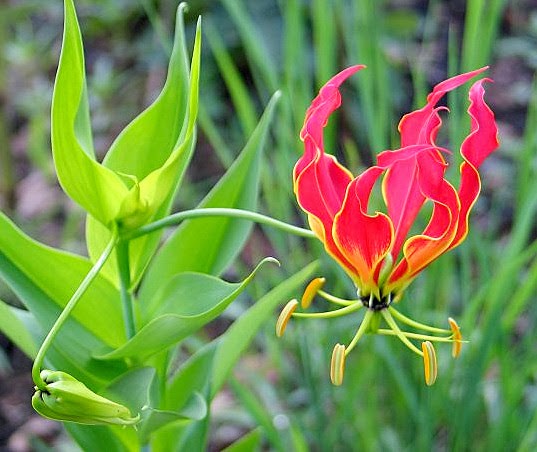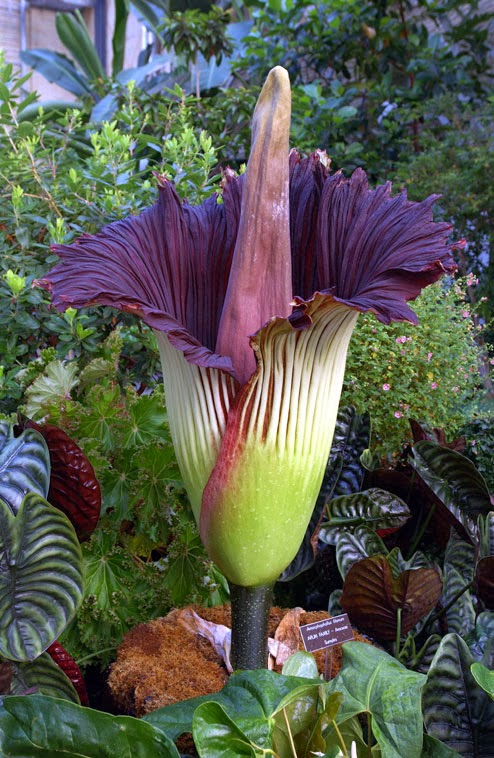Flame Lily
This rare
flowering plant is native of tropical regions of Africa & Asia and is naturalized
in Australia and the Pacific as well as being widely cultivated and belongs to
Colchicaceae family. Flame Lily normally grows as tuberous climbing plant and
produces strange red or yellow flowers with wavy edges. It is the national
flower of Zimbabwe. The most common English names are flame lily, gloriosa
lily, glory lily fire lily, superb lily, climbing lily, and creeping lily.
Bee Orchid
Bee Orchid
comes from the Mediterranean regions and belongs to the orchid family. This
perennial plant produces between one and ten flowers on each spike every summer.
Ophrys apifera, recognized in Europe as the bee orchid, is a permanent
herbaceous plant belonging to the family Orchidaceae. The flowers emit
allomones that entice the bee species Tetralonia cressa and Eucera pulveraceae.
Corpse
Lily
This is amazing
flower and is the largest flower in the world. It is unique and hard to find in
its habitat which is the rainforests of Bengkulu, Sumatra Island and Indonesia.
Flowers emit bad smell and can be as wide as one meter wide and weigh up to 11
kilogram.
Bird of
Paradise Flower “Strelitzia”
Bird of
Paradise also identified as Crane Flower is another uncommon flower from South
Africa. The plant belongs to the Strelitziaceae family and produced strangely
colorful and beautiful flowers that resemble a bird of paradise. The beautiful flowers
are formed in a horizontal inflorescence emerging from a stout spathe, and are
pollinated by sunbirds, which use the spathe as a perch when visiting the
flowers.
Huernia Oculata
Huernia
oculata, with its exclusive looking flowers, is one of the most gems like of
all. The corolla is blackish purple velvety with a pure white center which has
given upsurge to the saying that the flowers are like an eye. It is narrowly
related to Huernia hislopii. This flowering plant actually belongs to the
family of Apocynaceae. The plant produces slight succulent stems that can be
used to propagate the plant. The plant is impartially easy to grow in well-drained
soil and dry climate.
Bleeding Heart
A species of
flowering plant in the poppy family Papaveraceae, native to Siberia, northern
China, Korea and Japan. It is valued in
gardens and in floristry for its heart-shaped pink and white flowers (that are
poisonous). It is also known as “lady-in-a-bath”.
Snake’s Head
A species of
flowering plant in the family Liliaceae. Its other common names include chess
flower, frog-cup, guinea-hen flower, leper lily (because its shape resembled
the bell once carried by lepers), Lazarus bell, checkered lily or, in northern
Europe, simply fritillary.
Maypop
Passionflower
A fast growing
perennial vine with climbing or trailing stems with large, intricate flowers
with prominent styles and stamens. A member of the passionflower genus
Passiflora, and it is a common wildflower in the southern United States. Also famous
as purple passionflower, true passionflower, wild apricot, and wild passion
vine.
Torch Ginger.
It is a species
of herbaceous perennial plant, and it is an exceptionally red, waxy flower
found throughout gardens in Costa Rica. The eye-catching flowers are used in
decorative arrangements while the flower buds are a vital ingredient in the
Nonya dish laksa. In North Sumatra, the flower buds are used for a dish called
arsik ikan mas
Sea Poison Tree
Flower
A species of
Barringtonia commonly originate along the coasts of the Pacific Ocean and
Indian Ocean. They have a sickly sweet smell that entices bats and moths at
night. It is grown along streets for decorative and shade purposes in some
parts of India. It is also identified as Box Fruit due the distinct box-shaped
fruit it produces. The local name futu is the source of the name for the
Polynesian island Futuna. All parts of the tree are poisonous, the active
poisons including saponins.
Amorphophallus
titanum
Amorphophallus
titanum is famous as the titan arum, is a flowering plant with the largest
unbranched inflorescence in the world. The titan arum's inflorescence is not as
large as that of the talipot palm, Corypha umbraculifera, but the inflorescence
of the talipot palm is branched rather than unbranched. Due to its odor, which
is evocative of the smell of a decomposing mammal, the titan arum is considered
as a carrion flower, and is also recognized as the corpse flower, or corpse
plant. For the same reason, the title corpse flower is also attributed to the
genus Rafflesia which, like the titan arum, grows in the rainforests of
Sumatra.
Laelia, Flower
It is abbreviated
L. in the horticultural trade, is a small genus of 25 species from the orchid
family (Orchidaceae). This is one of the most important and popular orchid
genera, because of the beautiful flowers, their genetic properties and because
they are fairly easy in culture. Laelia flowers are found in the subtropical or
temperate climate of Central America, but mostly in Mexico. Laelia speciosa preferring
sunny, dry and cool conditions, and grow in the rainforest with a warm, humid
summer and a dry cool winter.


















